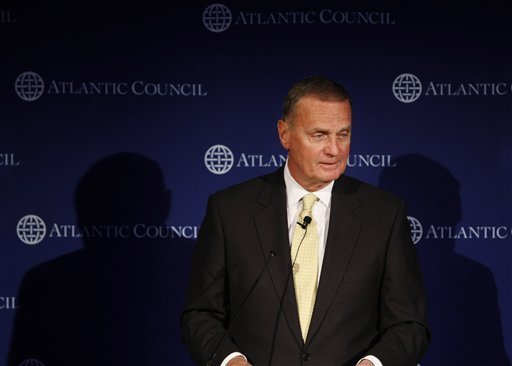
Former National Security Advisor Jim Jones says tackling the "real 21st century challenge" of maritime security and political instability in West Africa is "something we must do" as well as something we should do. He called on the United States and its NATO Allies to work together on these issues "Not only to make Africa a better place but, in so doing, to make the world a safer place."
He made these remarks in a keynote speech at an event launching “Advancing U.S., African, and Global Interests: Security and Stability in the Maritime Domain,” a landmark report by the Atlantic Council’s Michael S. Ansari Africa Center and On The Horizon Project. The report, written by John Raidt, director of the On The Horizon Project, and Kristen E. Smith, Assistant Director of the Ansari Africa Center, sounds the alarm on the deep reach of transnational terrorists, drug cartels, and other criminal enterprises in West Africa, and how, abetted by official corruption, these groups need a badly governed, poorly resourced maritime security regime to sustain their enterprises. It explores the adverse consequences for the U.S., West African countries and the broader International Community of the continued failure to counter, vigorously and proactively, adverse security, economic, and political conditions in the region.
Raidt gave a brief presentation of the report’s main findings and recommendations, describing vital interests that U.S. and African governments share that are currently at risk such as maintaining law and order, protecting the global maritime transportation network, ensuring long-term access to oil, and encouraging political stability and economic development.
Admiral Harry Ulrich, a Council Board Director and former Commander of the US Sixth Fleet and US Naval Forces Europe, praised the report, especially noting its call for immediate action in the form of a pilot program. He observed that far too many reports have been written on the problems of the African continent, blessed by the right people, and then allowed to gather dust on a shelf. He urged that this must not be allowed to happen with this project.
While noting that African problems require African solutions — which must be tailored to the specific needs of individual countries rather than "one size fits all" —the United States, its allies, NGOs, "and other stakeholders" have "a vested interest" in working together on these important issues. He stressed that the pilot project should begin with African partners with "Will, Skill, and a Bill." That is, they should have the political will to make the necessary reforms, have demonstrated that they possess the necessary building blocks for success, and commit to continued funding and maintenance so that the progress can be sustained after the project ends.
Ambassador Amina Salum Ali, Permanent Representative of the African Union to the U.S., stressed the ongoing efforts of the Commission in building a strong security framework. She stressed the need for sustained partnership between West African countries and the U.S. in strengthening maritime security. Reacting to a comment from Dr. Martin Kimani, the panel moderator, on “the infrastructure of security as a necessary support for economic infrastructure,” Ambassador Ali agreed noting that security and strong economic development were inextricably linked.
General Chuck Wald, a Council Board Director and Strategic Advisors Group member and former Deputy Commander of the US European Command, cited Jones’ maxim that "a virtual presence is an actual absence" and stressed the need for continuous present and engagement with Africa. At the same time, continuing the event’s theme of the importance of partnership, he argued that it is important that we "lead from behind," letting African leaders come up with solutions that fit the local culture and institutions and also serve as the public face of reform projects.
James Joyner is managing editor of the Atlantic Council.
Image: james-jones-atlantic-council-20090527-1_0.jpg
